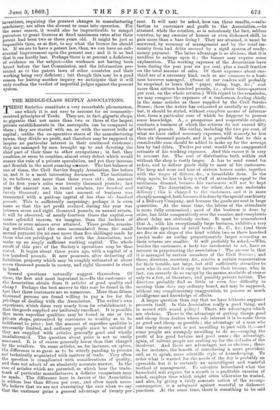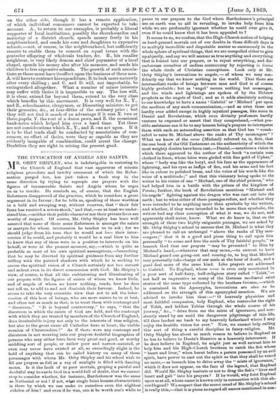THE MIDDLE-CLASS SUPPLY ASSOCIATIONS.
THESE Societies constitute a very remarkable phenomenon, one which it is not easy to account for on commonlyreceived principles of Trade. They are, in fact, gigantic shops,
so gigantic that not more than two or three of the largest private establishments in the metropolis can be compared to
them ; they are started with no, or with the merest trifle of capital ; unlike the co-operative stores of the manufacturing towns, they divide no profit, and therefore may be supposed to inspire no particular interest in their continued existence ; they are managed by men brought up to and devoting the chief part of their time to other occupations ; in fact, they combine, or seem to combine, almost every defect which would ensure the ruin of a private speculation, and yet they increase and flourish in the most amazing manner. The last balance of one of them, the Civil Service Supply Association, lies before us, and it is a most interesting document. The institution is, we believe, not more than three years old ; the amount of its first year's sales was twenty thousand pounds ; last year the amount was, in round numbers, two hundred and twenty thousand; and this vast amount of business was transacted with a paid-up capital of less than six hundred pounds. This is sufficiently surprising ; perhaps it is even more so that the net profit realized during the year was between seven and eight thousand pounds, an annual return, it will be observed, of nearly fourteen times the capital,—a more splendid success, we imagine, than the luckiest of traders or even miners ever attained. These profits, remaining undivided, and the sum accumulated from the small annual payment (in no case more than five shillings) made by those who are privileged to deal with the Association, now make up an amply sufficient working capital. The whole result of this part of the Society's operations may be thus stated. It began about three years ago, with a capital of a few hundred pounds. It now possesses, after deducting all liabilities, property which may be roughly estimated at about seven thousand pounds in money, and eight thousand in stock in hand.
Several questions naturally suggest themselves. Of these, the first and most important is,—Do the customers of the Association obtain from it articles of good quality and cheap ? Perhaps the best answer to this may be found in the fact that these customers are so numerous. More than fifteen thousand persons are found willing to pay a fee for the privilege of dealing with the Association. The writer's own experience, which dates very nearly from its establishment, is that the goods supplied are uniformly excellent. It is possible that more superfine qualities may be found in one or two private shops, patronized by customers so wealthy as to be indifferent to price ; but the amount of superfine qualities is necessarily limited, and ordinary people must be satisfied if they are supplied with articles generally good and wholly unadulterated. The question about price is not so easily answered. It is of course generally lower than that charged by the retailers. On some articles, as, for instance, on spices. the difference is so great as to be utterly puzzling to persons not technically acquainted with matters of trade. Very often the question is complicated with considerations of quality, and does not admit of an absolutely accurate answer. In the case of articles which are patented, or which bear the trademark of particular manufacturers, a definite comparison may be made. The difference here in favour of the Association is seldom less than fifteen per cent., and often much mores We believe that we are not overstating the case when we say that the customer gains a general advantage of twenty per
cent. It will next be asked, how can these results,—satisfaction to customers and profit to the Association,—be attained, while the retailers, as is notoriously the fact, seldom contrive, by any exercise of honest or even dishonest skill, to gain more than a bare living ? They are attained, it must be answered, by economy of management and by the total immunity from bad debts secured by a rigid system of readymoney payment. The latter advantage is so obvious, that it is needless to enlarge upon it ; the former may require some explanation. The working expenses of the Association have been during the past year six per cent. plus a small fraction on the total amount of sales. Of these expenses about onethird are of a necessary kind, such as are common to a business however managed. (Some of our readers will probably be surprised to learn that " paper, string, bags, &e.," cost more than sixteen hundred pounds, i.e., about three-quarters per cent. on the whole returns.) With regard to the remainder, we may compare the expenses of a tradesman dealing chiefly in the same articles as those supplied by the Civil Service Stores ; these the writer has estimated as carefully as possible, but, it should be stated, without complete means of information, from a particular case of which he happens to possess some knowledge. A., a prosperous and respectable retailer, conducts a business of which the returns do not exceed fifty thousand pounds. His outlay, including the two per cent. of what we have called necessary expenses, will scarcely be less than six thousand pounds, and it is probable that to this a considerable sum should be added to make up for the average loss by bad debts. Twelve per cent. would be no exaggerated estimate of his working expenses. And this excess it is easy to account for. The cost of distribution both within and without the shop is vastly larger. A. has to send round for orders, and to deliver goods daily to most of his customers. The keep and wear and tear of sixteen horses make, together with the wages of drivers, &c., a formidable item. In the shop, again, he has to keep a staff of attendants equal to the maximum demand, because his customers will not be kept waiting. The Association, on the other, does not undertake delivery ; this is charged to the customers, and it is more cheaply managed, both because it is done by the special machinery of a Delivery Company, and because the goods are sent in large quantities. At the same time, the labour of the attendants is more fully economized ; most of the business is done by order, but little comparatively over the counter, and complaints about delay are obviously useless. It must he remembered that A., with his exceptionally large business, exhibits a very favourable specimen of retail trade ; B., C., &c. (and there are five or six shops of the kind within two or three hundred yards) make an outlay proportionately larger according as their returns are smaller. It will probably be asked,—Who, besides the customers, a body too incoherent to act, have an interest in perpetuating the association ? The answer is, that it is managed by certain members of the Civil Service ; and these, directors, secretary, &c., receive a certain remuneration for their trouble, not large, but still sufficiently attractive to men who do not find it easy to increase their income, who, in fact, can scarcely do so except by the means, available of course only to a few, of literature, and possibly private tuition. The directors probably find as little or even less difficulty in meeting than does any ordinary board, and may be supposed, without any complimentary exaggeration, to possess as much intelligence and knowledge of affairs.
A larger question than any that we have hitherto supposed presents itself. Is this Association really a good thing, and in accord with sound policy ? There are advantages which are obvious. There is the advantage of getting things good and cheap from dealers whose sole interest it is to make them as good and cheap as possible ; the advantage of a man who has ready money and is not unwilling to part with it,—and some people are strangely unwilling to do so,—reaping the profit of his good fortune and good sense ; the advantage, again, of solvent people not making up for the defaults of the insolvent. And there are advantages not so obvious ; there is, for instance, the benefit of introducing a more provident
and, so to speak, more scientific style of housekeeping. To
order what is wanted for the needs of the day is probably an agreeable, but it is certainly an unintelligent and wasteful method of management. To calculate beforehand what the household will require for a month is a profitable exercise of mind, employs time which might often otherwise be wasted, and also, by giving a fairly accurate notion of the average consumption, is a safeguard against wasteful or dishonest practices. At the same time, there is something to be said on the other side, though it has a remote application, of which individual consumers cannot be expected to take account. A., to return to our examples, is probably a liberal supporter of local institutions, possibly the churchwarden and mainstay of a district church, spends money freely in his neighbourhood, and sends his sons and daughters to expensive schools,—not, of course, in the neighbourhood, but sufficiently remote to enable them to consort on equal terms with the genteeler offspring of wholesale traders, &c. B., his smaller neighbour, is very likely deacon and chief paymaster of a local chapel, spends his money also after his measure, and sends his children to less expensive schools. The growth of such associations as these must have its effect upon the business of these men. A. will have to contract his expenditure; B. to look more narrowly after every shilling ; and C. and D. will, not improbably, be extinguished altogether. What a number of minor interests may suffer with theirs it is impossible to say. The loss will, it is clear, extend far beyond them, extend to the very class which benefits by this movement. It is very well for X., Y., and Z., schoolmaster, clergyman, or Dissenting minister, to get their groceries, &c., at four-fifths of the ordinary price ; but they will not find it much of an advantage if it cost X. two or three pupils, Y. the rent of a dozen pews, and Z. the occasional bank-notes which helped him over a hard time. Yet these are not considerations which X., Y., and Z. can act upon. If it is to be that trade shall be conducted by associations of consumers, no effort of theirs, were they as capable as they are evidently incapable of combination, could arrest the change. Doubtless they are right in seizing the present good.































 Previous page
Previous page